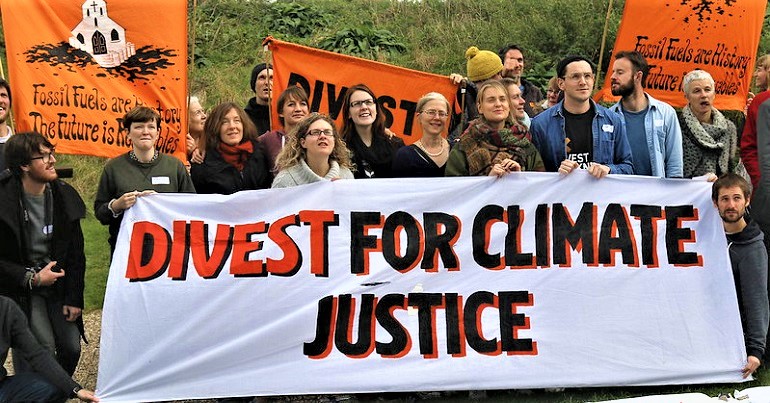Number of UK universities committed to divest from fossil fuels reaches 86

The total number of UK universities to publicly commit to not investing in fossil fuels has reached 86. The university of Brighton has joined the majority of universities in the UK in making the commitment off the back of the international fossil free campaign.
In doing so, the university has added its name to People & Planet and NUS’ ‘Fossil Free Declaration‘, becoming the 17th institution to do so. The ‘Fossil Free Declaration’ is designed for universities that currently have no investments in the fossil fuel industry but have committed to never invest in it in the future.
The declaration states:
Our university is a globally responsible institution and commits to remaining fossil free as an act of solidarity with the frontline and indigenous communities disproportionately impacted by both climate change and the extractivist projects of fossil fuel companies.
Student activist network People & Planet – which leads the university wing of the UK divestment movement -announced University of Brighton’s decision today after the university made the commitment earlier this year. At the time of the decision, Mike Bewlock Director of Finance at the University of Brighton said:
I am delighted that the university has made this commitment and is furthering our ethical investment practices. The declaration is in line with us announcing a Climate Emergency in January 2020 and is consistent with our ambitious target, set out in our strategic programme Brighton 2025, to reduce our carbon emissions to 4000tC02e, by 2025.
The University of Brighton is the third UK university to make a public divestment commitment in 2021. Two health institutions – the Liverpool School of Tropical Medicine and the London School of Hygiene and Tropical Medicine – made similar commitments earlier this year.
J Clarke, Co-Direct of Climate Campaigns at People & Planet celebrate University of Brighton’s decision. They told Bright Green:
It’s great to see that the hard work of the student divestment movement has created lasting momentum that is seeing universities going Fossil Free in quick succession. Those universities without public commitments to divest from fossil fuel companies are increasingly exposed as outdated, irresponsible and indefensible investment decisions that do not match actions with rhetoric around the climate crisis in UK higher education.
Other Brighton institutions not taking action
University of Brighton’s decision has triggered calls for other institutions in the city to make similar moves. Although the University of Sussex divested in 2018, both West Sussex Pension Fund and East Sussex Pension Fund have retained investments in fossil fuel companies despite active local divestment campaigns.
Speaking on the news, Tom Druitt, a Green Party city councillor in Brighton & Hove said:
Here in Brighton & Hove, Green councillors have been campaigning for divestment for a number of years. The Green Group of Councillors put forward a motion in 2015 calling on the East Sussex Pension Fund (ESPF) to divest, which sadly didn’t get passed at the time. Fast forward two years, and the Labour group put forward a very similar motion, which passed with Green support, but without a seat on the Pensions Committee we currently have no mechanism to implement it.
Divestment from fossil fuels is a powerful and crucial step towards halting climate change. We are delighted to see the University of Brighton take this important action and believe this makes the current position of the East Sussex Pension Fund even harder to justify. We look forward to the day when the Pension Fund follows the University’s lead.
Wider movement
People & Planet has also renewed calls for other universities to divest from fossil fuels. J Clarke told Bright Green:
The Open University has been well-positioned to cope with the global crisis of COVID-19. The institution’s investment portfolios, on the other hand, remain heavily invested in the companies most responsible for the global climate crisis, with over £4 million estimated to still be in fossil fuel companies.
These calls were echoed by student campaigners at the Open University. Grace Curtis from Fossil Free OU told Bright Green:
The Open University has thus far been incredibly complacent in its response to the climate crisis despite its extensive environmental teaching and research, and this needs to change, starting with fossil fuel divestment.
The global divestment campaign seeks to utilise the power of large, public institutions to remove the ‘social license’ the fossil fuel industry has to operate, by demonstrating their unwillingness to continue to invest in it.
Over 1,300 institutions across the globe have made public commitments to cut their financial ties to the fossil fuel industry. As a result, an estimated $14.56 trillion of investments have been withdrawn from the sector.
Such commitments have been made after consistent and sustained public pressure from grassroots activists and campaign groups.
When student activist network People & Planet launched the UK wing of the Fossil Free campaign in universities in 2012, no higher education institutions in the UK had committed to divest from the fossil fuel industry. But after the University of Glasgow became the first to divest in 2014, dozens have followed suit.
PS. We hope you enjoyed this article. Bright Green has got big plans for the future to publish many more articles like this. You can help make that happen. Please donate to Bright Green now.
PPS. Bright Green has an exciting series of events coming up. Join us for debates, interviews and much more.
Image credit: Fossil Free Greater Manchester




We have to up the anti. Ethical investment, mainly about the environment, has been going for decades. Any body joining now deserves derision, not praise.
We have no clear offering about how we need to reconfigure society, which is where we now have to lead.
Being greener than thou no longer cuts the mustard, if it ever did.